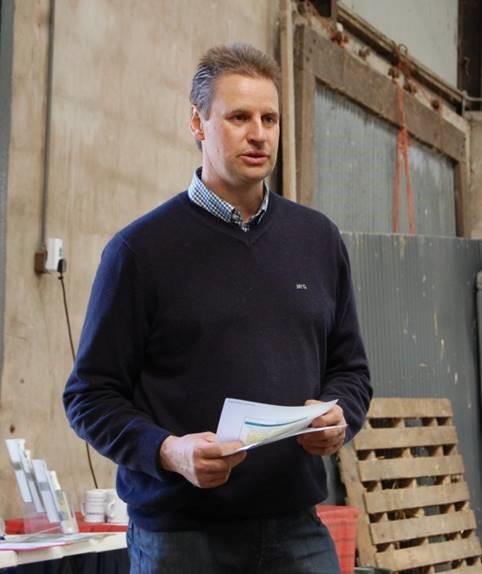Maximising Ewe & flock performance with Provita Advance+ Silage Inoculant
Every farmer would like control of factors beyond the farmgate, but this cannot be the case. With both beef and lamb prices volatile, there is obvious uncertainty what future prices. Nevertheless the majority of farmers are resilient to this and been through this all before, and now know to focusing on things within the farmgate to improve efficiencies and target better profitability.
John Martin runs a mixed enterprise at Gordonall farm, Greyabbey and focuses heavily on farm efficiency. When asked to summarise his management approach, John stated, “do it once and do it right, keep things simple and control what you can and pay attention to detail.” Gordonall is predominantly a sheep enterprise with 650 composite breeding ewes going to the ram, 17 acres of spring barley for on-farm feed and straw, and 38 acres of willow is grown as an alternative crop. Also breeding dairy heifers from a neighbour were wintered on a bed and breakfast system.
Nutrition is the largest variable cost associated with sheep production, and so many sheep farmers like John Martin, seek to improve its management. Like most traditional production systems, sheep nutrition has been based on a “least cost” system with the aim of minimising feeding costs without limiting production (in terms of ewe and lamb health, number of lambs born alive per ewe, and lamb growth rates). Similar to the situation in dairy and beef herds, significant savings can be made in feed costs where forage quality is excellent, and good quality forage can be capable of meeting the energy and protein requirements of the ewe until the latter stages of pregnancy.
Grazing is in full swing with a rotational system employed at Gordonall. Focus on grass quality does not stop there with a big emphasis by John placed on making the best quality grass silage each year. Approximately a third of the farm is taken for a 1st cut silage. It is grazed first by the sheep and is closed off as early as possible. This produces a thick high-yielding high-quality sward. John commented, “Sheep are very fussy about silage so it must be high quality. However you do need to control their intakes during the winter, as it is healthy for them to lose a little body condition (BCS), good coming up to lambing. We can certainly still do this with high quality silage fed to pregnant ewes based on required intakes relative to BCS.”
John took his 1st cut just after the first May Day Bank Holiday. It was cut dry but unfortunately saw rain on the ground. Nevertheless it was ensiled in good order and John was happy with the yield and quality. John said, “he would prefer wet leafy silage to dry stemmy silage as it would still produce better results” and he went on to say, “grass should be cut when it is ready within reason.” This must be a recipe for success as John was awarded 1st place in the UFU Silage Making Beef and Sheep category for the 2018 season. Well done John!
The cost between making good quality and poorer quality silage is not that different with similar fertiliser, contracting and cover costs. The actual fact, real cost will come when it comes to feeding out that silage when lower daily liveweight gain is achieved from forage and more concentrates fed. For instance, high feed-value grass silage can reduce concentrate requirement by approximately 75% whilst maintaining animal performance, So really what does make the real difference for silage quality is the cutting stage and the use, or not, of a good additive. Additionally a good silage additive is only a small percentage of the total cost needed to make silage per tonne, therefore it will produce a beneficial return of investment.
One ingredient that has been ever present over the years for John Martin is Provita Advance+ silage inoculant. It supplies 1.2 million CFU’s per gram of forage of a unique triple strain bacterial mixture which is freshly blended at Provita’s Omagh facility. Advance+ produces a rapid fermentation to reduce dry matter losses, increased sugar content, increased available energy and reduced unwanted spoilage to help at feedout. This accumulates to produce a better quality forage that results in better animal performance.
John summarises the benefit of Advance, “We have had consistently good silage since using Advance+, even in wetter years or more difficult conditions. I am very happy to continue using Advance+ on future crops.”
For more info FREEPHONE 0800 328 4982. Written by George Shaw, MPharm MPSNI, Technical Adviser, george.shaw@provita.co.uk, 07841 926219
